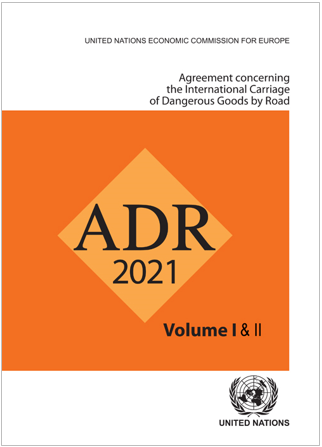Agreement concerning the International Carriage of Dangerous Goods by Road (ADR 2021)
Agreement concerning the International Carriage of Dangerous Goods by Road (ADR 2021)
Adopted on 30 September 1957 in Geneva under the auspices of the United Nations Economic Commission for Europe (UNECE), the ADR entered into force on 29 January 1968.
This authoritative Agreement is intended to increase the safety of international transport of dangerous goods by road. Its Annexes A and B contain the technical requirements for road transport, i.e. the conditions under which dangerous goods, when authorized for transport, may be carried internationally, as well as uniform provisions concerning the construction and operation of vehicles carrying dangerous goods. They also establish international requirements and procedures for training and safety obligations of participants.
The Agreement has been regularly amended and updated since its entry into force. This version has been prepared on the basis of amendments applicable as from 1 January 2021.
Until now, the title of ADR was the "European Agreement concerning the international carriage of dangerous goods by road (ADR)". Following the decision of the Contracting Parties to the Agreement, the word European is removed in this new edition to acknowledge the global status of ADR and as an encouragement to all United Nations Member States to join and fully implement it, supporting progress towards road safety targets of the Sustainable Development Goals.
For more information on this agreement, visit the ADR section of the UNECE Transport Division Website.
_____
This revised version is based on changes applicable from 1 January 2021. It contains new or revised provisions concerning in particular the transport of electrical storage systems (including lithium batteries installed in goods transport units and defective batteries), medical waste and radioactive materials. The COVID-19 pandemic has led to an increase in demand for medical gases (particularly medical oxygen), which, along with infectious, hazardous or radioactive substances are being transported with special care and are covered in this edition.
The Agreement concerning the International Carriage of Dangerous Goods by Road (ADR) is an important trade facilitation tool and thus helps reduce the risk of protectionism. Except for dangerous goods which are totally prohibited for transport, and except when transport is regulated or prohibited for reasons other than safety, the international transport of dangerous goods by road is authorized by ADR in the territories of the Contracting Parties, provided that the provisions of the agreement are respected. As a Contracting Party, during the transitional and post-Brexit period, the United Kingdom will continue to apply ADR requirements.
ECE/TRANS/300
Complete set of two volumes
Sales # E/F/R.21.VIII.1
ISBN 978-92-1-139179-4 (English)
Languages: English, French (Russian forthcoming)
This publication can be obtained from distributors of United Nations Publications or from the Sales Office (see how to order).
Fonte: UNECE
